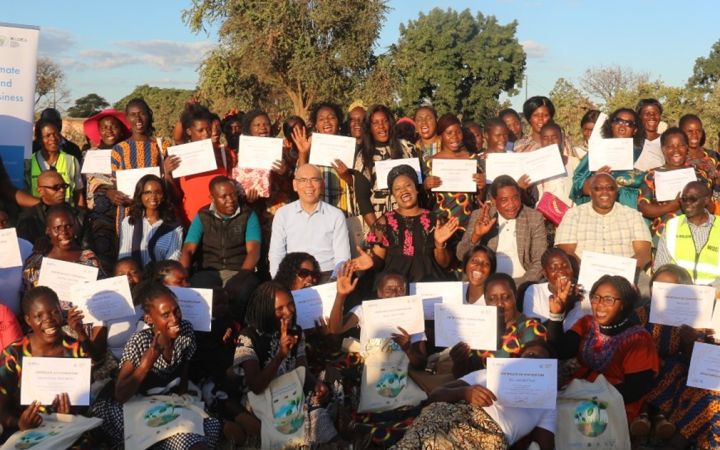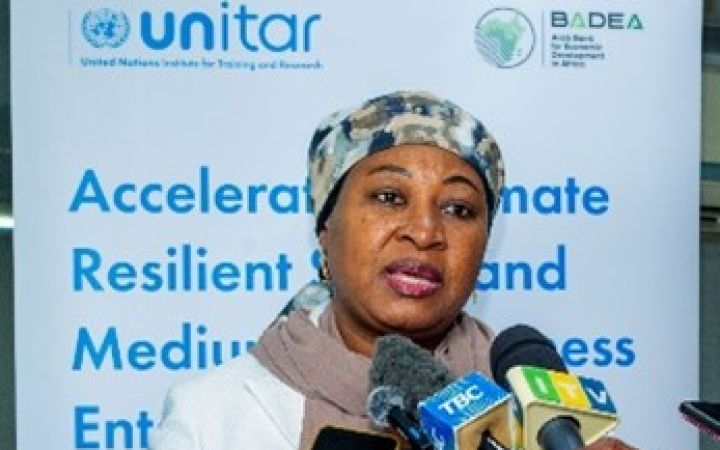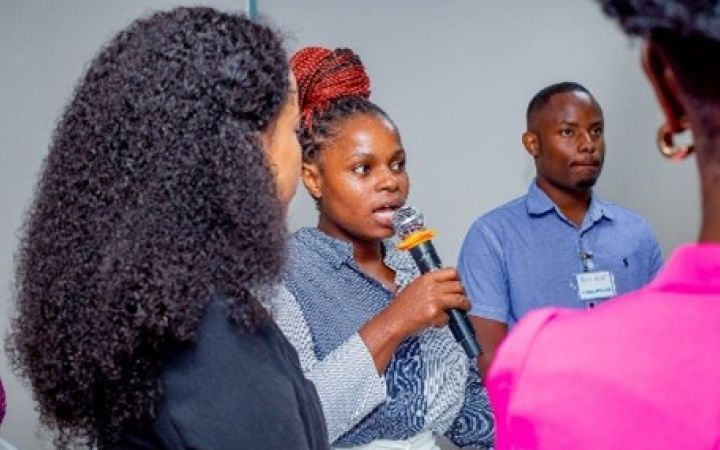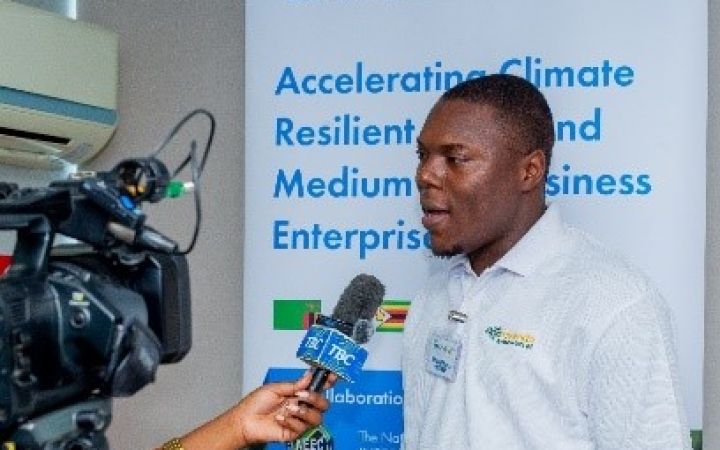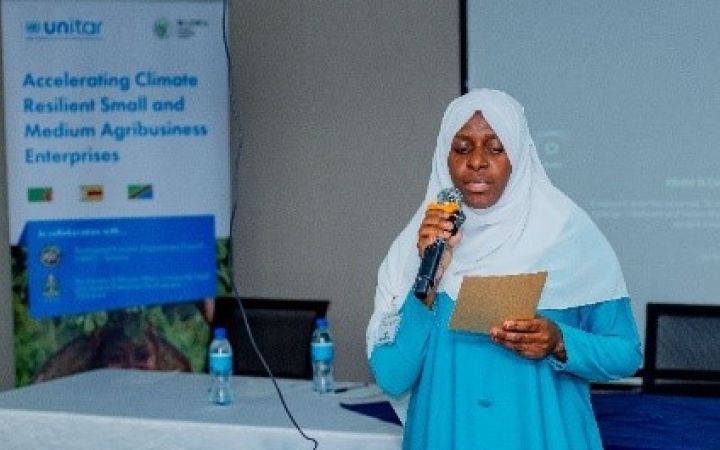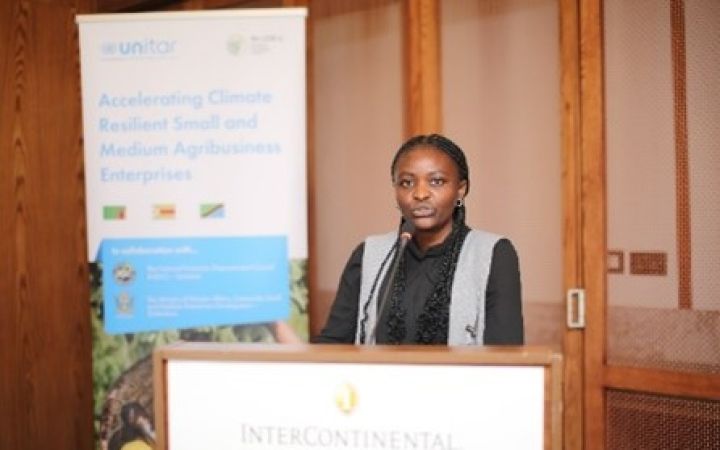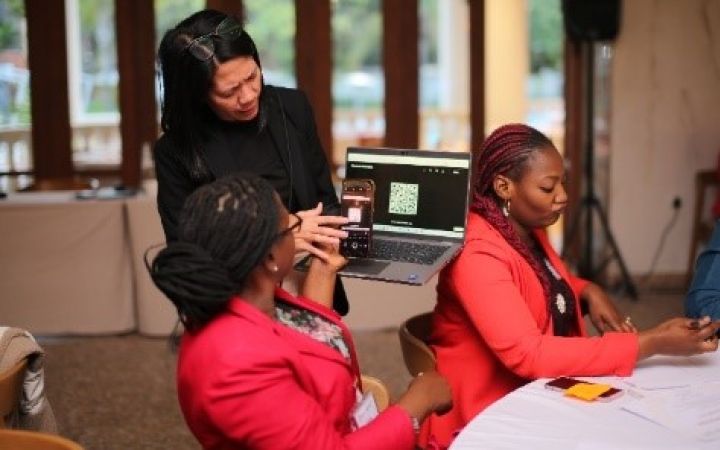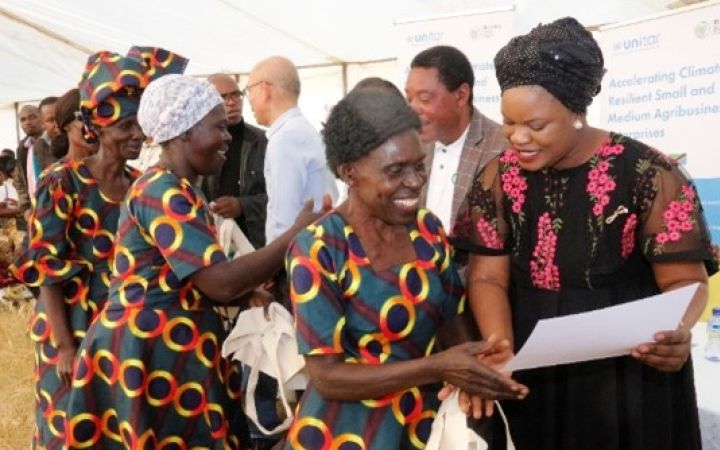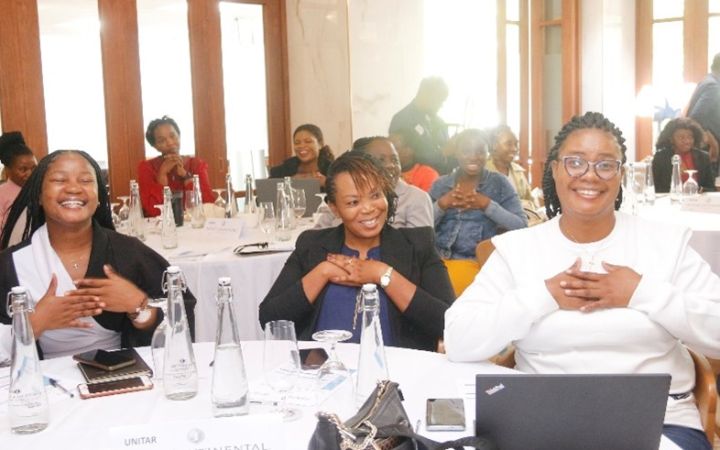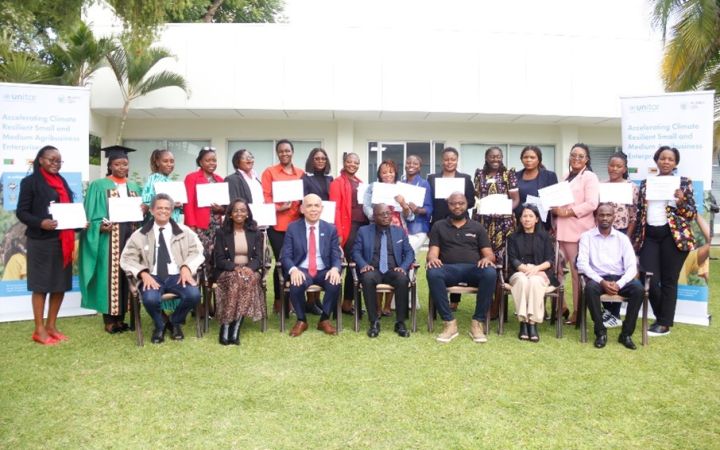- From 20 to 28 May 2024, BADEA and UNITAR hosted over 200 entrepreneurs from Tanzania, Zambia and Zimbabwe training programmes focused on climate-resilient livelihood development.
- Participants received expert training, pitch practice, UNITAR alumni guidance, and business development resources to develop or scale their agricultural business models.
- The programme aims to improve climate resilience, local livelihood development and community welfare, while contributing to national strategic development plans.
20 June 2024, Geneva, Switzerland – From 20 to 28 May 2024, BADEA and UNITAR hosted over 200 participants from training programmes on climate-resilient livelihood development.
This programme focused on women and youth from Tanzania, Zambia and Zimbabwe facing challenges related to imminent threats and frequent extreme weather events due to climate change. All three countries rely heavily on agriculture as their main source of livelihood which made this initiative an exceptional opportunity to empower women and youth to develop smart, sustainable agricultural practices. Agriculture is a source of livelihood for many developing countries and populations, and the programme aims to further develop livelihood opportunities and contribute to economic diversification and employment. Participants in the programme gained critical knowledge and skills to develop and scale enterprises, contribute to their communities and support their national strategic development plans.
The training on agribusiness development aimed to nurture innovation, mindset shifts, and application of sustainable smart agricultural practices to participants’ business models and enterprises. Participants aimed to leave the programme with roadmaps to launch their sustainable, scalable business models or enterprises that can enhance individual and community welfare long-term.
The six months of training have already yielded results for the participants, where they have been trained in how to access financing, develop strategies and access to market. Overall business development relates to how they can partner and work together to grow their enterprises. As a result of the impact of the programme, 15 enterprises have been able to be formalized and about 12 have been able to expand their businesses. So, this programme is very good, and we look forward to expanding it in the future as NEEC in ensuring youth have access to key business and enterprise development skills.” –– Madam Beng'i Mazana Issa, National Economic Empowerment Council Executive Secretary
Hear from some of the participants from the programme in Tanzania, Zambia and Zimbabwe regarding the benefits of the programme for their new and existing enterprises.
So, through this programme, we were able to be introduced to partners drawn from various sectors such as government authorities, finance institutions and budding entrepreneurs, who were able to empower us when it comes to understanding how to legally register your business and the compliance processes. For instance, BRELA – Business Registration and Licensing Agency.” –– Mary Kopwe, Founder of Beewax value chain from Tanzania
We have received a lot of knowledge and skills. And personally, as a leader as a result of this particular engagement and programme, we've been able to transition from being registered as a sole proprietor to a company limited by shares. This will helps us widen our market reach not only in Dar es Salam but other places in Tanzania and East Africa.” –– William Mdemu, Founder AgriMwendo from Tanzania
Before the programme, I was not able to write a business proposal or how to pitch, but now I can spend about two minutes pitching my idea and in addition to being able to write a business plan that I can show to investors and other people who can see the potential Ii need and invest in my business.” –– Asha Kimungwi, an Upcoming Poultry farmer from Tanzania
As an academic, I have benefited from this programme in many ways. One is understanding business development and tapping into my science project to develop a special bacterium that will be used in animal feeds, soil regeneration and other uses that can support the agricultural sector in Zambia. UNITAR’s hard work and willingness to go above and beyond were instrumental in achieving my goals and creating a positive experience for all the participants.” –– Yasa Mwelwa, Organic Oasis (Scientist and Entrepreneur) from Zambia
As a result of the programme, we have been able to scale and improve our family land by diversifying and improving bird rearing where we have introduced quails, guinea fowls and road runners while increasing seedlings and integrated farming practices.” –– Precious Mweemba & M’hango Nchimunya (Entrepreneurs mother and daughter), Nachimweno Seedling & Improved Village chickens farming
UNITAR and BADEA programme has equipped me with skills that have helped in positioning my project as a consultancy. Besides working on my business enterprise, I offer training services to women who want to start agribusiness where I work with community organizations and even foreign embassies in their diverse programmes. As such, I plan to continue cascading the skills learned to thousands of women who want to improve their farming practices and improve their livelihoods.” –– Amanda Munyoro, Founder and women empowerment advocate W.I.F.E (Women in Farming and Entrepreneurship from Zimbabwe
As a beneficiary of this programme, I am grateful for the skills and practices learned as I am able now to link my expertise and business to ensure food security and support smallholder farmers while raising awareness on food security issues. The pitching skills and connections with financiers is a good addition to the programme as financing is key in ensuring the sustainability of agriculture.” –– Mercy Chatyoka, Founder Pik it Fresh and Food nutritionist
The programme offered incremental learning journeys from abstracts to applied phases of livelihood and SME development. In the second phase, participants received guidance from experienced coaches and successful entrepreneurs to help them through practical and rigorous exercises in business initiation, risk mitigation and start-up activities.
To deliver this initiative, UNITAR collaborated with the National Economic Empowerment Council (NEEC) in Tanzania and the Ministry of Women Affairs, Community, Small and Medium Enterprises in Zimbabwe.
One of the key components of the programme was the engagement of ecosystem partners. Government agencies, microfinance banks, incubators and accelerators, and civil society organizations provided advice and mentorship to participants on topics like compliance, market linkages and financing.
While the training phase of the programme has ended, UNITAR and BADEA are continuing their support through virtual coaching and connecting participants to financial institutions and ecosystem enablers who could provide seed funding for new enterprises and the expansion of small businesses.
To help participants prepare to market themselves to potential funders and investors, the programme held in-person pitching sessions wherein participants practised pitching value propositions and business plans and projects. The programme is thankful to the Zimbabwe Women's Microfinance Bank, the Vision Fund, CRDB Bank, and the Absa Bank for conducting coaching sessions and offering expert support and consideration of the projects presented by the participants. In addition, UNITAR alumni in host countries were invited as seasoned entrepreneurs to share their lived experiences around building and running enterprises in their business environments. This alumni engagement further equipped graduating participants with tools for running a successful agribusiness.
UNITAR and BADEA are also offering post-training coaching engagements that further prepare beneficiaries to pursue start-up or business expansion support from ecosystem partners. To further optimize the programme’s impact, UNITAR and BADEA will also conduct impact assessments to measure the results of individual transformations and larger impacts in participants’ communities.
ABOUT BADEA
The Arab Bank for Economic Development in Africa (BADEA) was established pursuant to the resolution of the 6th Arab Summit Conference at Algiers (28th November 1973). The Bank began operations in March 1975. BADEA is a financial institution owned by eighteen Arab countries members of the League of Arab States (LAS) which signed its Establishing Agreement on 18th February 1974. The Bank is an independent International Institution enjoying full international legal status and complete autonomy in administrative and financial matters. It is governed by the provisions of its Establishing Agreement and the principles of international law.
ABOUT UNITAR
The United Nations Institute for Training and Research (UNITAR) is a dedicated training arm of the United Nations. In 2022, UNITAR trained over 395,000 learners around the world to support their actions for a better future. In addition to our headquarters in Geneva, we have offices in Hiroshima, New York and Bonn and networks around the world.
The Division for Prosperity is based in the Hiroshima Office and Geneva. We seek to shape an inclusive, sustainable and prosperous world through world-class learning and knowledge-sharing services on entrepreneurship, leadership, finance and trade, digital technologies and nuclear disarmament and non-proliferation. We empower individuals from least-developed countries, countries emerging from conflict and small-island developing states – especially women and young people – to bring about positive change.


